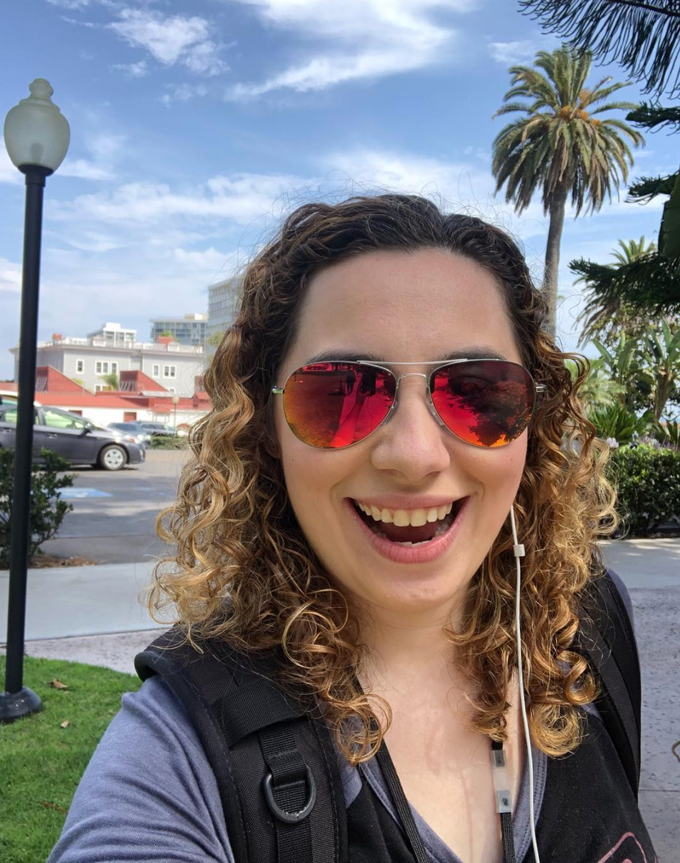Scott Snyder explains how Dark Nights: Death Metal sets up "what DC is all about for 2021 and beyond"
Dark Nights: Death Metal writer Scott Snyder discusses what's ahead for the DCU following the epic story's conclusion
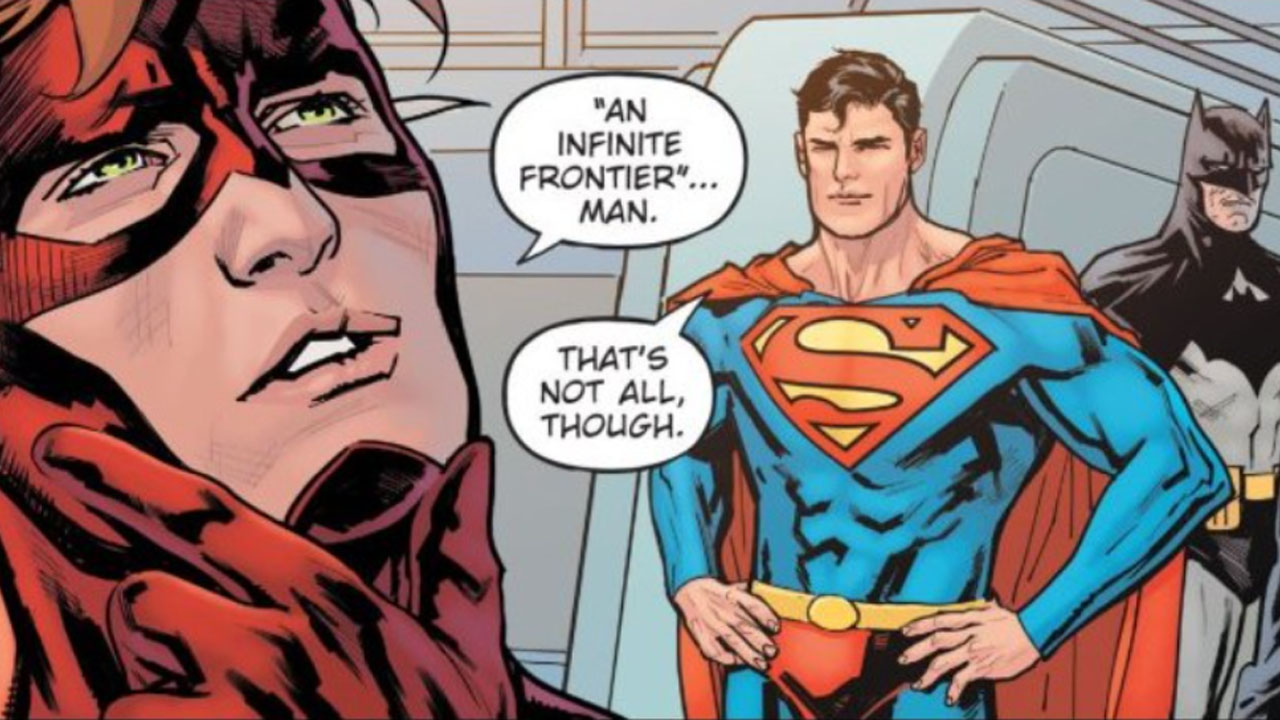
Dark Nights: Death Metal #7 arrived with plenty of revelations about the event itself and what its conclusion means for the future of the DC Universe. The reality-bending issue brought back Alfred Pennyworth (sorta), established that numerous DC heroes may be resurrected in the months to come, and totally redefined DC's Multiverse as an all-encompassing Omniverse.
With so much to unpack, Newsarama spoke with Dark Nights: Death Metal architect Scott Snyder to discuss how this 'Anti-Crisis' event leads to Infinite Frontier and 'Future State,' Snyder's future DC plans, and how the ramifications of Death Metal could play out across DC's newly revitalized line when it kicks off in March.
Spoilers ahead for Dark Nights: Death Metal #7
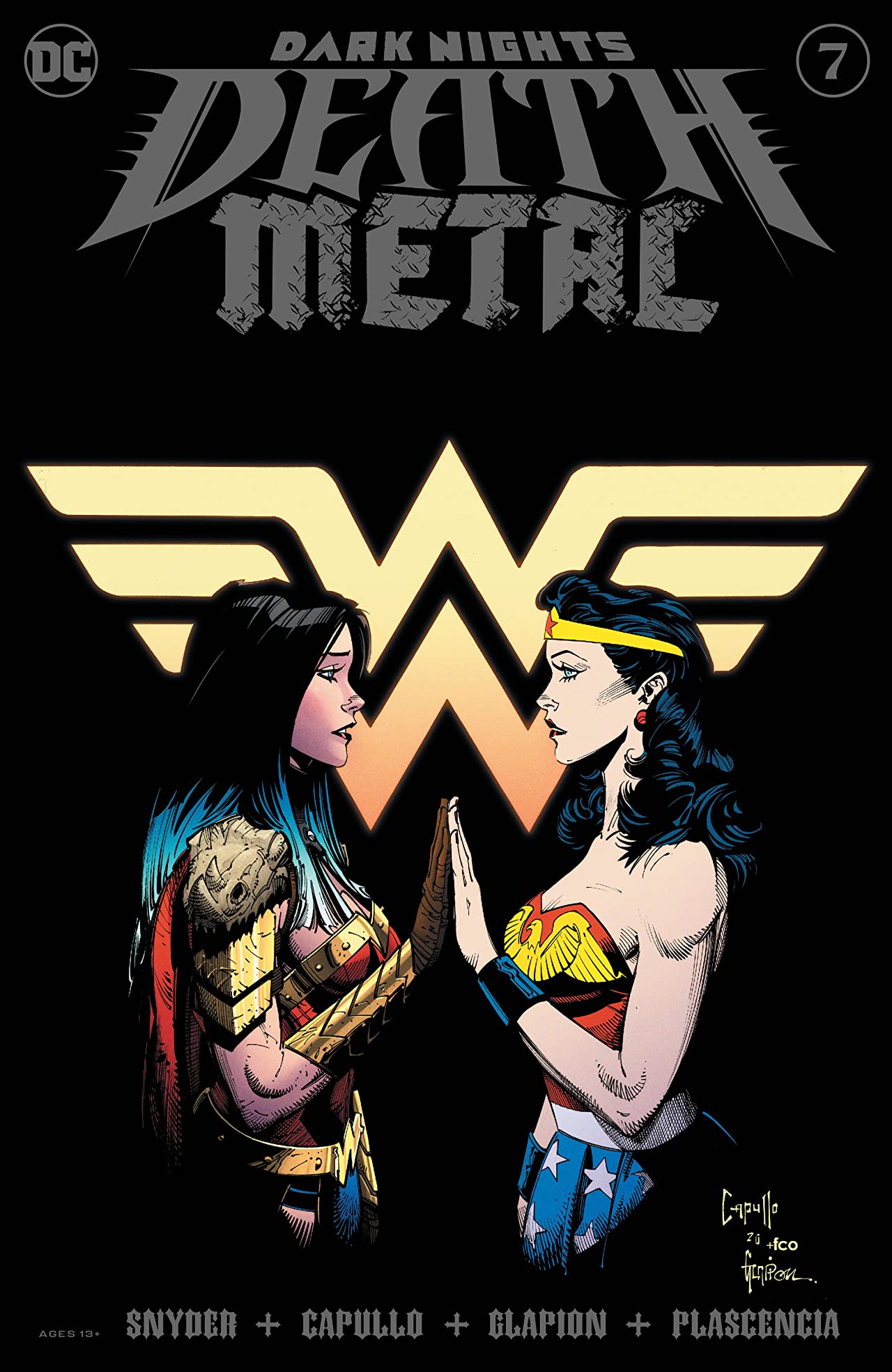
Newsarama: Scott, to jump right in, you've called Death Metal an 'Anti-Crisis,' and that description really begins to take shape in the final battle between the Darkest Knight and Wonder Woman. Would it be fair to say that Death Metal as a whole is your love letter to DC's full history?
Scott Snyder: Completely, it was always planned as such. When we did Metal back in 2017, we really weren't sure if it would go over well, like the aesthetic or the bombast of it. We wanted to do our take on a throwback to that sort of over-the-top comic book lunatic event that we grew up with and make it personal.
That story was very much about looking around at the world and suddenly only seeing dark reflections of yourself, which to me is how it feels when you're going through depression. It's how you feel sometimes when things get particularly dark in life. So, that story was largely like a testing ground where it was deeply personal and internal.
It was sort of like a warm-up for this one where we felt like, well, if it goes over well let's do this sequel to it, which we began to pitch back then when we had the first one on the drafting table. It would be much more outward-looking. It would be about comics, and what we love about them, our beliefs about what we think is best about comics, but also what we hope comics will embrace going forward. The kind of ideology that we believe in. So, it's very much a love letter both to DC's history and to the vision that I think [DC editor-in-chief] Marie Javins and so many great creators and editors have for DC in 2021 and beyond.
It's funny because the road here was a bit wild just as this era in the real world has been completely tumultuous and volatile. But strangely I feel like the story always stayed where it was, and it wound up really linking up with what ended up being on the other side of it. There were moments when we weren't sure if we were going to do something as confluence as Infinite Frontier as we went along with the event.
Get the best comic news, insights, opinions, analysis and more!
But the fact that DC and Warner Bros. elevated Marie, who is both a dear friend and an incredibly talented and qualified person to be our captain really made everything fit perfectly, just because she's been our editor on Death Metal. She helped edit Metal. She edited Justice League for me. So, her vision of what the DCU could be and should be is very much in sync with what Death Metal was always about. It's about honoring this great comic book history, honoring creators of the past, honoring stories of the past, and then using that history as a foundation to build something even more expansive, daring, and bold going forward.
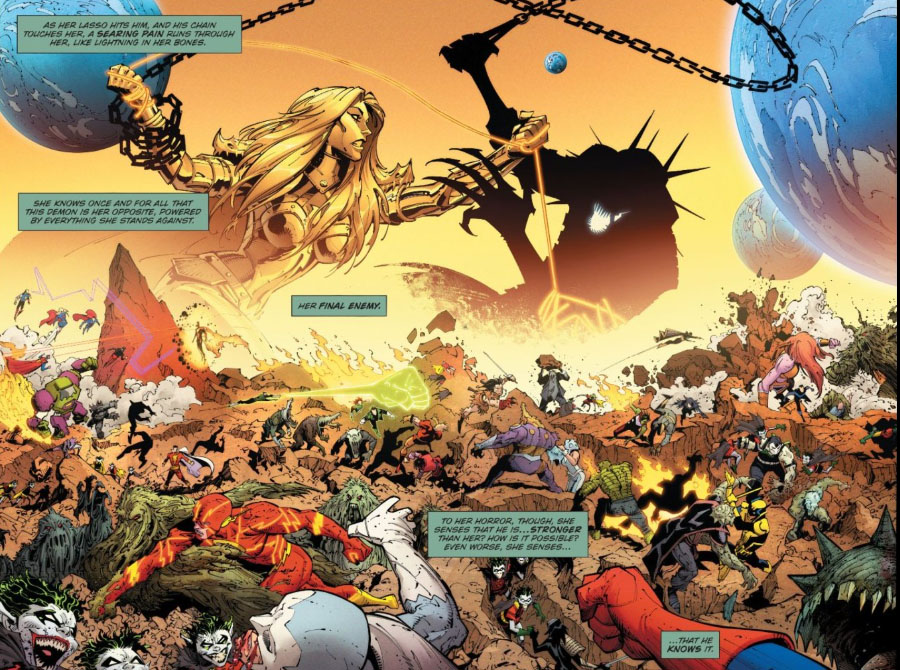
Nrama: The Darkest Knight seems to represent the 'darkness' of reboots. He seems to offer the false illusion of an 'Eden' of a singular rebooted continuity, and the exposition a couple of pages later seem to be referencing reboots like 'The New 52' ("a world where they are young again. where they're new again" you write). How close are we on this theory? Let's talk about some of the implications of the resolution in whatever detail you can.
Snyder: 'The New 52' is where I got my big start on Batman, and there was so much I loved about the boldness of that initiative, and there was so much I loved about 'Rebirth' as well about the way they really respected the legacy of DC and this history of DC.
But what we're trying to do, and what I think Marie wants to do is take the kind of daring and boldness of 'The New 52,' where we're taking some risks - both on storylines, new creators, new directions - and we're also really making sure that our classic characters, and some of the kinds of really great traditional comic book storytelling is there as well that was there with 'Rebirth' taking the best of that too and making something our own in this moment.
So, it's not so much that I think reboots are awful, but with what the Darkest Knight is speaking to there, honestly, is the self-importance of taking a moment in time, both in real life when we say nothing matters but us and now, and so who cares about history? We disregard it, who cares about generations from now? So, you disregard your care for many things from natural resources to your own ethics.
He's saying that kind of thinking is what we're built to do. Why care about anybody but yourself, why care about anything, but this moment? Why care about anyone outside of your circle at most?
And what comics is about, in my opinion, is empathy and compassion. It's about looking to these incredible stories and characters to learn how to be better people. That's the whole purpose of these heroes, mythic figures - is to teach us to be brave in the face of our fears, to challenge the things that feel like systemically impossible to move and to reach higher than we're supposed to and to be inspired.
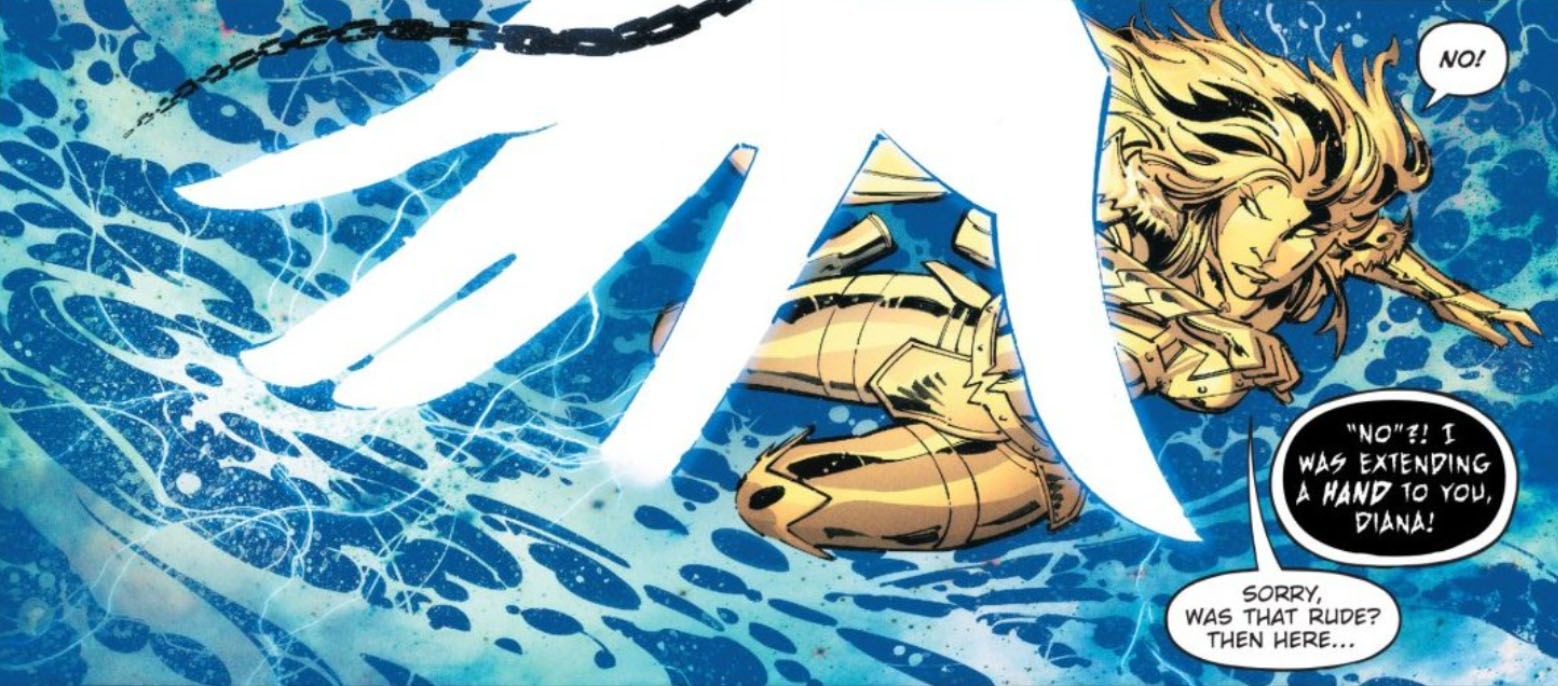
In that way, I think what Darkest Knight represents for me is a kind of total self-importance and desire to silo yourself from everything outside of your own interests. It's so prevalent right now, and what Wonder Woman represents both as a harbinger of the truth, but also as a harbinger of love is the opposite. She's someone who says, no, this last of this golden rope of truth connects us to every generation past, every generation forward. Everything matters, everything you do, and everything you say.
You think, well, I can do this now and it won't have an impact later. Who cares about the impact later? It has an impact and it matters. The past isn't beautiful. The past isn't easy to look at a lot of the time, but that's the whole point. You look at it, you reckon with it, you celebrate the good moments, you deal with the bad moments, and that's how you grow and strive to be better than you're supposed to be.
That's really what the core message of the whole event has been from the beginning and why Wonder Woman, why this ending, why we believe, and why I can stand by it so proudly. I genuinely love and believe in what DC is trying to do at this point on the other side of Death Metal with 'Future State,' with Infinite Frontier, which I'm a small part of as well. All of it. I really think it's going to be a bright and fantastic era where we're trying new things, and yet at the same time being very celebratory about our past.

Nrama: Why did you choose Wally, who seems cured of his omnipotence, as sort of the everyman who gets the explanation of all the new DCU architecture?
Snyder: Because I think he's a character who a lot of people love, I love as well, as a Flash. And yet he's been really elastically pulled in different directions over the last year to try and make him something darker and almost more substantive in a cosmic way then he was originally intended.
I think those are great risks to take, but we really felt at this point that he's a character that we wanted to return to his roots because it's something different than you've seen him. You haven't seen him in that iteration in a while, and we have really big plans for him that I can't reveal yet, but that are in Infinite Frontier that deposit him as the kind of restorative character of the story.
For us, he's someone whose displacement was a big part of 'Rebirth.' He represented in a lot of ways the legacy and the history that was missing that was then brought back through 'Rebirth.' But since 'Rebirth,' he's kind of been moved around a lot and he's taken a lot of different shapes. So, putting him back where he's meant to be at least in this moment for us was a way of saying some things now are back to being grounded, familiar, and excitingly classic.
Then other things about both his mission, his role in the DCU, and other characters around him are taking on brand new roles as well. It's that same thing we believe in, honestly, with Infinite Frontier, which is a mix of the big hearty comfort food everyone that's been a long-time fan wants to see, and then tweaking it to make it something you haven't quite tasted before.
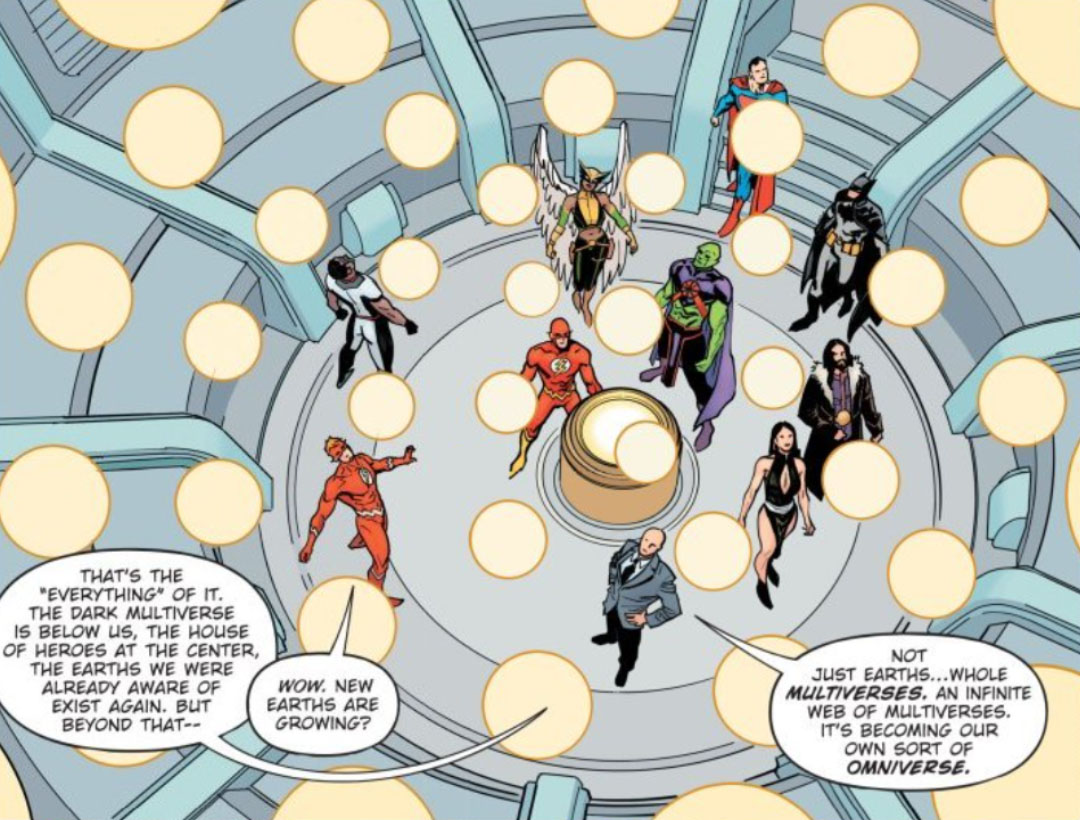
Nrama: The DCU is now an Omniverse of multiple Multiverses but you still peg this new Alpha Earth – 'Elseworld' - as the center of the Multiverse. is that correct, is it just at the center our multiverse? What else can you tell readers about it? Would it be a safe assumption that an Alpha Earth's opposite is an Omega Earth?
Snyder: I don't want to spoil too much, but I would say that is a very good guess. And all I'll tell you is that the series that Joshua Williamson is building, Infinite Frontier itself, which begins in March with the zero issue that we're all doing together, that showcases a bunch of new storylines, new creative teams that are beginning right after a 'Future State' - starts giving readers those building blocks that will create an architecture that goes straight to Elseworld, and will explain the importance and danger of that as well.
So, it's one big story. I'm starting to take a bit of a backseat for a while. I have two big projects at DC that I'm doing in 2021, but at least for a few months, I'm going let Josh Williamson, James Tynion, and all the great creators on so many books from Ram V, Joëlle Jones, to Tom Taylor, so many people I love and have faith in to just make the DCU brighter and more exciting than we've seen in a long time.
Nrama: And since you named checked Darkseid as being MIA just a few panels previous to the explanation of 'Alpha Earth,' would it make sense for readers to wonder if Darkseid and a very mysterious Omega Earth could have a connection?
Snyder: It would make sense. Everything in that coda means something. That's what I'd say. From the creation of the Totality, the characters we picked, there's story for, and every sort of small calculation made in that coda is tied to a bigger story coming in 2021. None of it is superfluous. It's all meant to set up where Wonder Woman, Diana herself is going to be, how Yara lands. All of it. So, I would say it's worth scrutinizing and having fun speculating on those kinds of things.

Nrama: Will Alfred's return in Death Metal #7 have ramifications for the future of the Bat Titles?
Snyder: I don't want to spoil it for James. I feel like James is playing around with the repercussions of that beat. All I'd say is that it was important for me personally, at least, to see Alfred on my way out for a moment and have the Bat-Family complete. If you were going to raise the dead and have everyone in it together, there was no one who would put a small brat in his place the way Alfred would talk to the Robin King. It was a beat that I really wanted.
The repercussions of Death Metal, we really want people to understand are pretty gigantic in the way that not only is all of it in continuity, obviously, and it sets up 'Future State' and Generations: Shattered, but it sets up a lot of what everybody is leaning into for Infinite Frontier, both spiritually and in terms of what Infinite Frontier is about and with some of the storylines.
What happens to Wonder Woman at the end of Death Metal then spins into Diana's series right off the bat. Similarly, James is dealing with the repercussions of Metal very quickly in Batman and in Joker as well.
Alfred was an important moment for me. There's very little in Death Metal that I think you won't see echo down the line in different ways. We wanted it to be something that has a lot of impact in ways that are additive rather than subtractive.

Nrama: The one shot, Last Stories of the DC Universe, had a lot of potential new status quos. Sinestro returning as a Green Lantern, Roy Harper's resurrection, Dick Grayson and Barbara Gordon reigniting their romance. Are these threads you think some titles will pick up on?
Snyder: I know some of the plans from some of the people that you mentioned, and some of them do have repercussions both in the fact that those moments will be acknowledged within the books, and wind up affecting the characters emotionally. Other moments are moments that the characters sort of don't want to acknowledge and their lack of acknowledging becomes part of the story.
Some books are actually building towards moments that you saw in those stories in different ways. Honestly, some books will not mention, don't need to mention, anything that happened in Death Metal one way or another, and that's completely fine too. Our motto was basically to talk to the writers who were doing the stories with those characters after Death Metal made sure everyone's on the same page, whether or not the subsequent writers wanted to pick up the pieces from those stories. At least they felt the character wasn't doing anything that they really objected to.

It's all kind of part of one tapestry. So, yes, those things happened and they're remembered by the characters, whether or not the characters in the new series or with new creative teams acknowledged those things, you have to wait and see, because I know at least a few of them are things that are going to be dealt with in very different ways in the books, and some of them won't be dealt with at all, which is totally fine as well.
Nrama: There are also references to more characters returning from the dead – walk us through that. Why was this something you wanted to add? Who would you like to see return?
Snyder: There are a ton of characters I'd love to see come back, not just from the past, like Sgt. Rock and that stuff that are here now, but Roy and Alfred. There are a bunch, but I don't want to give too much away because I feel like that line is 100% in there because somebody is building story with that.
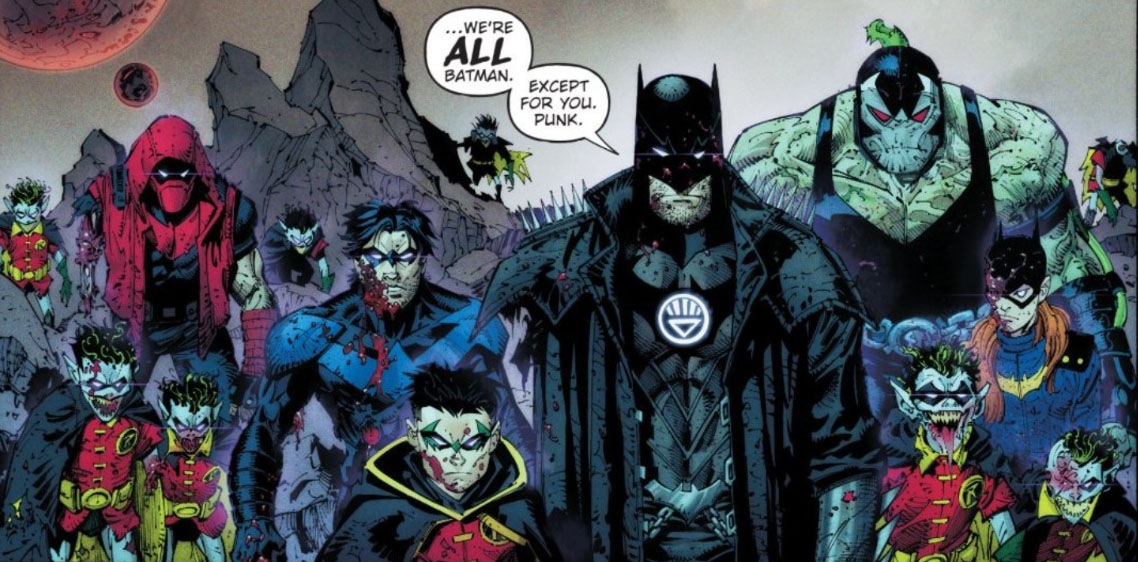
Nrama: The result of Death Metal seems to be that everything in DC's history counts. But on the other hand, many very loyal DC readers like to make some narrative sense of it. They like there to be canon too. So, is there a way to describe how all these realities and timelines and versions of events co-exist with one another, especially since you describe heroes getting their memories back and the notion they may experience flashbacks of past existences?
Snyder: My feeling is what we wanted to do with it was say that every story that happened in mainline continuity, not on another Earth - not like Red Son, for example, which has always existed on a separate Earth, an 'Elseworld' story for Superman - but every story that happened on our Earth in various eras is now remembered in one way or another by these characters.
So, all of history is part of their collective memory, an individual memory. So, what they can do is that any character can reckon with, deal with, seek out solace from any memory from DC's past. What we wanted to do is say every story that you've ever loved is now within this character's history and memory going forward.
What that allows us to do as well is build outward. It's almost like if all history is said, and there aren't alternate memories and alternate histories in different ways, then you can build outward from this one tree into all these different branches.
So, that was the idea - to be able to expand the multiverse, expand the characters' missions and adventures by having history behind them set. There's only one version of each character in terms of like, Barry Allen is Barry Allen. He remembers all of Barry Allen's memories from the past, and now he can go on to even greater things as the Flash because of that. His mission will be expanded in really cool ways.

Nrama: Are there any plans to follow up on the Totality and its line-up of heroes and villains, or is that an open-ended gift to the creators that want to pick up the threads?
Snyder: There are definitely specific plans that tie into Josh's Infinite Frontier series. But it's also a gift for anyone else that wants to use it. My hope is that other writers, editors, and artists will want to pick it up. But there are story plans in place already for the kind of spine series that Josh is building.
He has such great ideas and plans for it. He really wants to do something epic, grand, and majestic in the spirit of Metal, Death Metal, Crisis, and all of that stuff too, in terms of this sort of big exploratory high stakes story. I think people will be really, really thrilled with what he's going do over there in that book.
Nrama: Is this still what you consider your last big DCU story, at least for a while? Do you consider the last pages your parting gift to other writers? Do you ever see Death Metal having another sequel or continuation one-day even if you aren't attached to it?
Snyder: I'd always be okay with that. Greg and I are kind of baked into the DNA of the Metal brand. It's not even the marketing of it. It was just him and me messing around and coming up with the title when we first did it and coming up with the whole aesthetic of it together. So, it feels pretty organic to us, but I would always support anyone coming on to try to do something to carry that spirit or torch forward. I'd be thrilled and excited to see it. The same way it always makes me happy to see someone use the Court of Owls, James Gordon Jr., Batman Who Laughs, or any of that stuff.
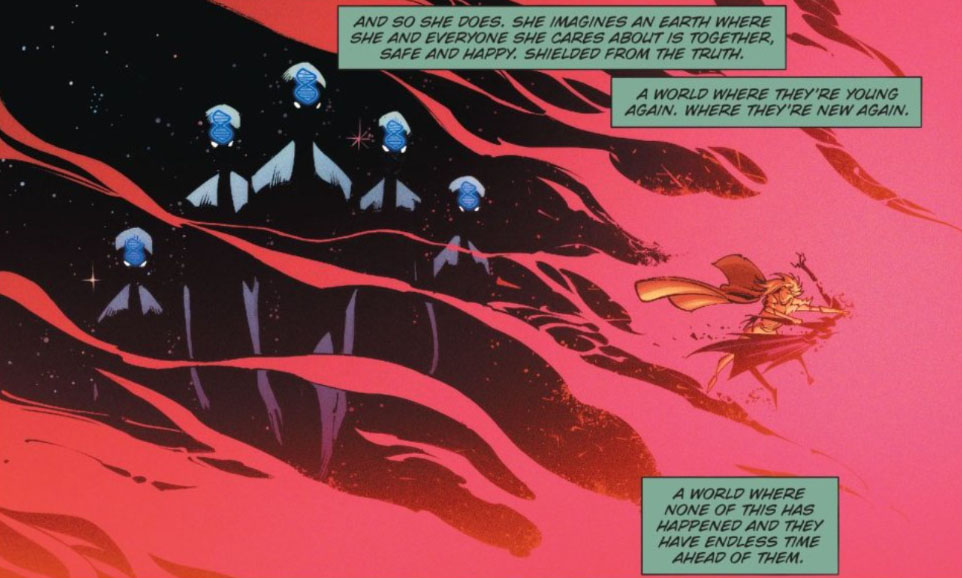
In terms of whether or not we would do a sequel ourselves, I mean, sure. At the end of the day, we don't have any plans to, and it was funny because I've done a few interviews so far for about Death Metal and I've gotten asked that every time. The funniest part is that until I first was asked it, I promise you, I was talking to James Tynion earlier today, and I was like, did I ever mention anything about that? And he was like, no, you've never considered it. I was like, I didn't think I did.
So, there's no plans for one, and Greg and I have a lot we want to do together outside of this kind of mantle of Metal. We're doing a creator-owned title, and then we have stuff that we want to do with DC ourselves outside of it. So, if we did do it, it would be quite a long time before we'd be back for it.
The biggest thing that I want to say about it honestly, I did see it as the last big epic franchise thing I was going to work on, at least for a long time. To that end, we wanted it to really speak to the fans about not only how much we love these characters, what we think they mean, and the potential in them to show us how to be better in these tough moments, but as a thank you to everybody that supported us as a team all these years. Ten years in August, since Greg and I started together, and to all of the other creators that have built such amazing things that have inspired us, new people coming in, the editors, all of it.
We wanted the ending to be additive, a love letter, and to be a thank you. And to just say, here's some pieces that you guys as creators asked for, hopefully some of you guys as fans asked for, here's some things that editors thought would be cool, and all of it speaks to this singular vision of the DCU as a place that's both respectful and celebratory of its past and very endearing and exploratory when it comes to its future.
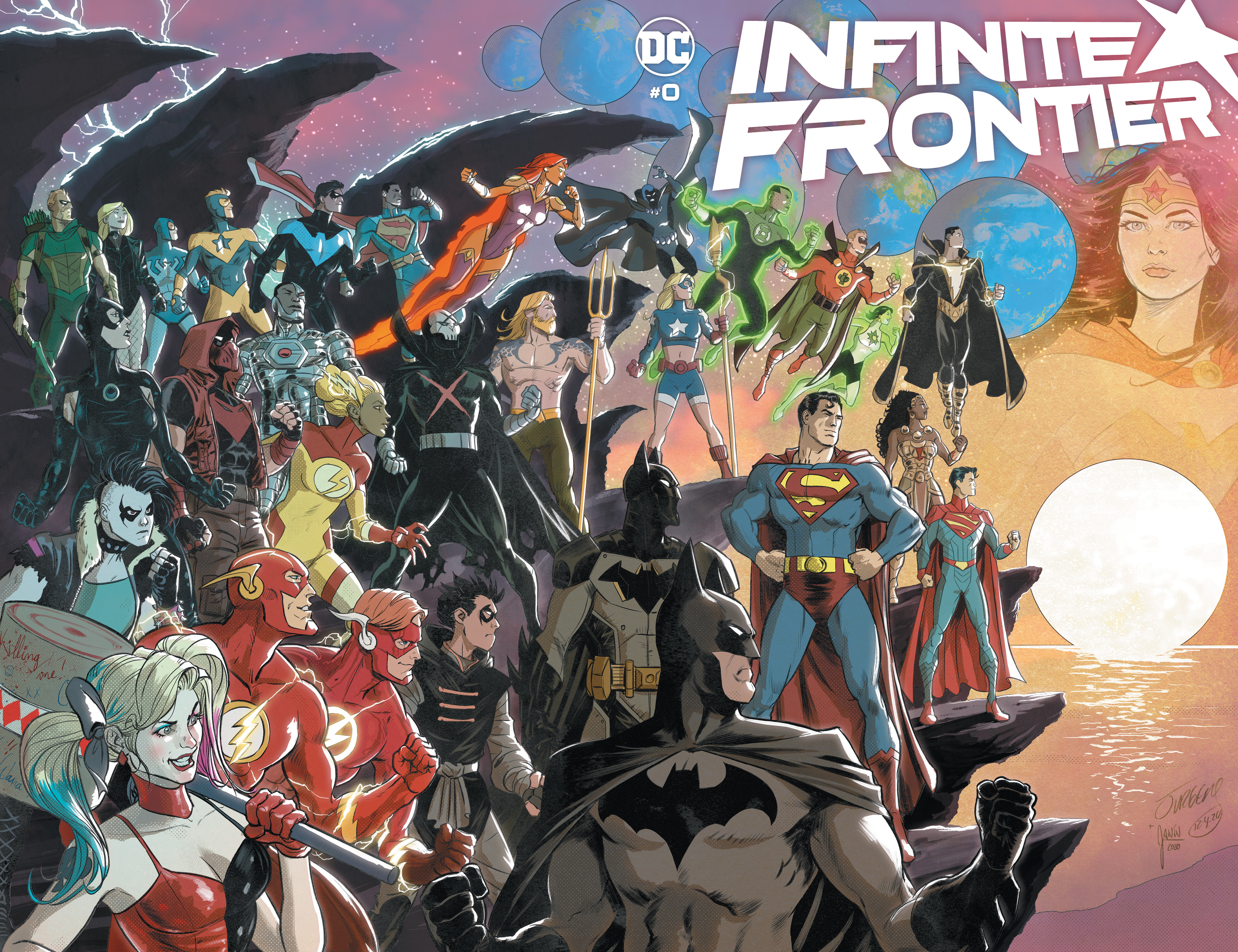
Nrama: Your name is attached for Infinite Frontier #0 for March. What can you tease about your role for that title and your next step at DC?
Snyder: I helped construct it. What happened was, when we were finishing up Death Metal, 'Future State' was coming together as well, as kind of being defined a few months ago as something that would be a glimpse of possible futures of DC. And as they started to figure out which pieces of those futures were going to actually happen when, and I was looking at this timeline with Marie, I said to her, why don't we do something like an issue that says all these things that you believe about what the line is going to be and what we're headed towards? Because really what you're doing is you're expanding the boundaries of DC. You're making it something where there are more possibilities for storytelling.
There are new generations of characters and there's all of this great classic storytelling. All we need to do is one issue, but instead of just being me writing it, or me and Josh and James writing it as an extension of Death Metal, why don't we invite in the people working on the books, artists and writers, to collaborate, to tell us what they want in there, any of that stuff, and make it a Giant and have it really speak to the core values of what DC is going to be going forward?
She loved the idea. I said I'd be happy to help with the plot. There's a spine story to it that's 16, 20 pages. And then there are all these other stories from the different groups. There's a Wonder Woman group story. There's a Superman group story. There's a Batman group story and so on.
I'm just a co-writer on the spine story with Josh and with James on that, setting up everything from his series, Infinite Frontier, to explaining some of the ideas and principles of what Infinite Frontier really means for DC, which is the stuff I've been telling you like this idea of through story, showing that we're putting our money where our mouth is.
We're elevating some classic characters in really big ways that I think will make long-time fans hugely excited to see them both put back in starring roles, but put back in even cooler ways than you've seen. And we're trying to put some energy, force, and support behind brand new concepts and new characters as well. So, that's the goal – and to do it through story and through great art in the book. Show everybody what DC is all about for 2021 and beyond.
Now that Dark Nights: Death Metal is over, will it claim a place among the best DC stories of all time?
Kat has been working in the comic book industry as a critic for over a decade with her YouTube channel, Comic Uno. She’s been writing for Newsarama since 2017 and also currently writes for DC Comics’ DC Universe - bylines include IGN, Fandom, and TV Guide. She writes her own comics with her titles Like Father, Like Daughter and They Call Her…The Dancer. Calamia has a Bachelor’s degree in Communications and minor in Journalism through Marymount Manhattan and a MFA in Writing and Producing Television from LIU Brooklyn.
